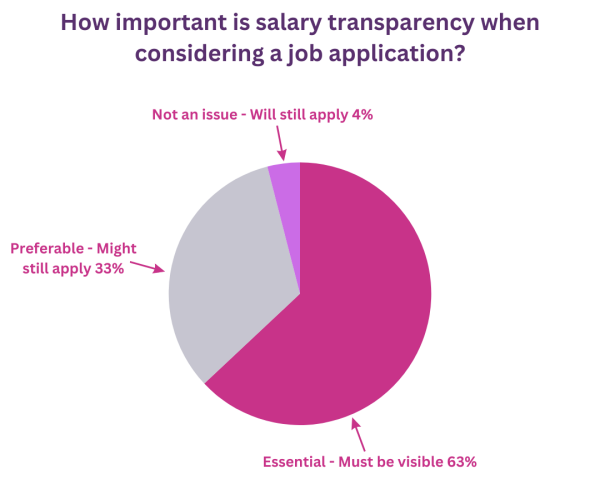In the recruitment world, the topic of salary transparency in job advertisements is often a heated debate. Our recent LinkedIn poll highlights the significance of this issue: 63% of participants indicated that salary visibility is essential when considering a job application, while 33% found it preferable, and only 4% stated it was not an issue.
Poll Results:

We frequently encounter varying opinions from both employers and job seekers regarding this topic. Let’s delve into why salaries are often not disclosed in job ads and examine the pros and cons for employers when it comes to posting salaries.
Why Aren’t Salaries Often Disclosed?
- Competitive Advantage: Employers may choose not to disclose salaries to avoid giving competitors insights into their compensation structures. This can help maintain a competitive edge in attracting top talent without revealing too much.
- Flexibility in Negotiations: Non-disclosure allows for flexibility in salary negotiations. Employers can adjust offers based on the candidate's experience and skills without being confined to a predefined range.
- Internal Equity Concerns: Transparency might lead to internal disputes if current employees discover discrepancies between their salaries and those offered to new hires. Employers may fear that this could impact morale and lead to demands for raises.
- Market Variability: Salaries can vary widely based on factors such as location, industry demand, and the specific requirements of the role. Employers might prefer to discuss compensation during the interview process to better match the candidate’s expectations with what they can offer.
Pros of Posting Salaries
- Attracting the Right Candidates: Disclosing salaries can attract candidates who are comfortable with the offered range, thereby reducing the number of unsuitable applications and saving time for both recruiters and job seekers.
- Building Trust and Transparency: Openly sharing salary information can build trust with potential employees, signalling that the company values transparency and fairness.
- Improving Diversity and Inclusion: Salary transparency can help mitigate biases and ensure a more equitable hiring process. It can encourage applications from underrepresented groups who might otherwise hesitate due to uncertainty about compensation.
- Streamlining the Hiring Process: Clear salary information upfront can expedite the hiring process by setting clear expectations from the start, reducing the back-and-forth of salary negotiations.
Cons of Posting Salaries
- Reduced Negotiation Leverage: Employers might feel they lose the ability to negotiate salaries based on the candidate’s unique qualifications and experience if a fixed range is publicly disclosed.
- Potential Internal Discontent: Existing employees might compare their salaries with those advertised, leading to dissatisfaction and possible turnover if they perceive inequities.
- Market Constraints: Public salary ranges might not always accurately reflect the dynamic nature of market conditions, leading to difficulties in attracting top talent if the posted salaries are perceived as non-competitive.
- Unqualified Applications: While transparency can attract the right candidates, it can also result in a flood of applications from individuals solely motivated by the salary, regardless of their fit for the role.
Conclusion
The decision to disclose salaries in job ads is a complex one with significant implications for both employers and job seekers. Our poll clearly shows that a majority of job seekers prefer or require salary transparency. At Darwin Hawkins we recognise the need to balance transparency with strategic considerations.
Employers should weigh the benefits of attracting suitable candidates and fostering trust against the challenges of internal equity and negotiation flexibility. Ultimately, a tailored approach that considers industry standards, company culture, and the specific needs of the role might offer the best solution.